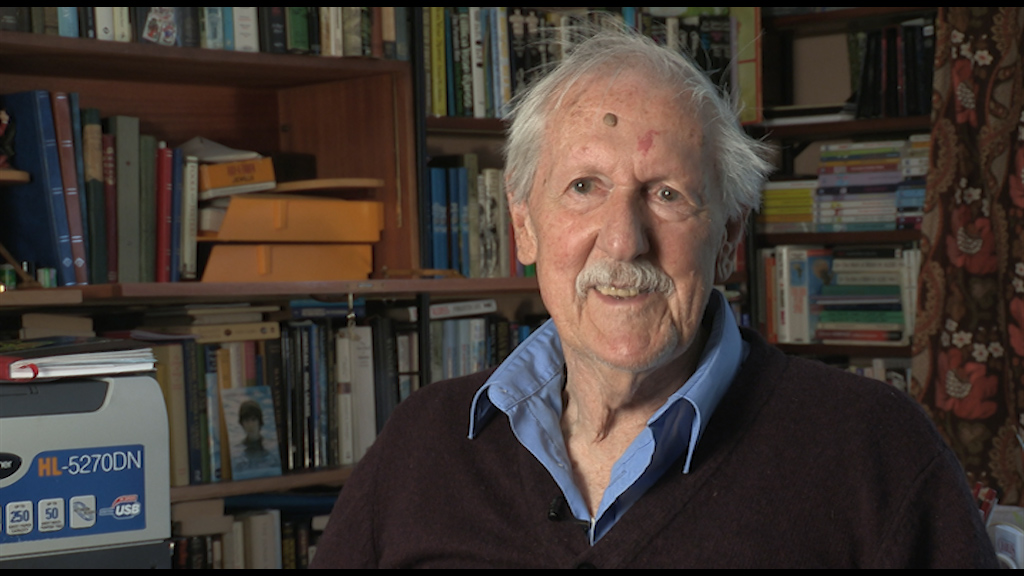NEXT STORY

Being down on my uppers
RELATED STORIES

NEXT STORY

Being down on my uppers
RELATED STORIES


|
Views | Duration | |
|---|---|---|---|
| 51. How I came by a Hermes typewriter | 45 | 03:37 | |
| 52. Being down on my uppers | 36 | 01:59 | |
| 53. My friend Harry Harrison | 52 | 01:27 | |
| 54. From misery to success | 67 | 02:35 | |
| 55. A memorable family occasion | 50 | 03:15 | |
| 56. Three generations of Buccaneers | 33 | 02:41 | |
| 57. Buying a house on spec | 33 | 05:06 | |
| 58. I fall in love with Yugoslavia | 55 | 05:43 | |
| 59. The black olives of Yugoslavia | 42 | 01:50 | |
| 60. A year’s-worth of free petrol coupons | 30 | 02:08 |


It was not the happiest of times, but it was mitigated by the fact that I was having some literary success. And, moreover, I worked... sorry, I've got this written down because I had forgotten... Oh yes, I worked on the Committee of Management… I used to go up to London and work for the Society of Authors. Very pleasant man in charge of it... I don't have his name... and, eventually I became the Chairman of the Committee of Management, and I enjoyed that, and so I met real authors, you know, and that was a treat in itself. They were all very pleasant, and I did that for some years, and then they retired me, of course. So that was my attempt to work for my fellow men, really.
And the number of books that I had written seemed to increase, and the science fiction community here and in the States, but particularly in the States, provided me with a lot of ready money and then… oh, yes, and another fine bit of kindness that came this way…
There was a man called Chawnley. I was in the antiquarian bit of the shop. Chawnley would come in to look after all the typewriters for the company. And so he'd stop and have a chat with me, and we were very friendly, and his offices were just down the other end of the Turl. So we knew each other quite well and eventually I went to see him, and said, 'Do you think you could lend me a typewriter? At the moment I'm so broke, I don't know that I can offer you any money, but eventually the money would come. Have you got something you could lend me?' And he said, 'Oh my dear boy, I can see that you're in trouble. Yes – look, have this'.
And he gave me a typewriter... a Hermes Swiss typewriter. Wasn't that kind? He gave me a typewriter, and so I could continue my trade. One never forgets those things.
And so that typewriter stayed with me for ages. When I'd cleared off to Yugoslavia, I took it with me and it served as a pillow, as well as typing out notes.
And things were moving on.
Brian Aldiss (1925-2017) was an English writer and anthologies editor, best known for his science fiction novels and short stories. He was educated at Framlingham College, Suffolk, and West Buckland School, Devon, and served in the Royal Signals between 1943-1947. After leaving the army, Aldiss worked as a bookseller in Oxford, an experience which provided the setting for his first book, 'The Brightfount Diaries' (1955). His first science fiction novel, 'Non-Stop', was published in 1958 while he was working as literary editor of the 'Oxford Mail'. His many prize-winning science fiction titles include 'Hothouse' (1962), which won the Hugo Award, 'The Saliva Tree' (1966), which was awarded the Nebula, and 'Helliconia Spring' (1982), which won both the British Science Fiction Association Award and the John W Campbell Memorial Award. Several of his books have been adapted for the cinema. His story, 'Supertoys Last All Summer Long', was adapted and released as the film 'AI' in 2001. His book 'Jocasta' (2005), is a reworking of Sophocles' classic Theban plays, 'Oedipus Rex' and 'Antigone'.
Title: How I came by a Hermes typewriter
Listeners: Christopher Sykes
Christopher Sykes is an independent documentary producer who has made a number of films about science and scientists for BBC TV, Channel Four, and PBS.
Tags: Society of Authors
Duration: 3 minutes, 37 seconds
Date story recorded: September 2014
Date story went live: 17 August 2015